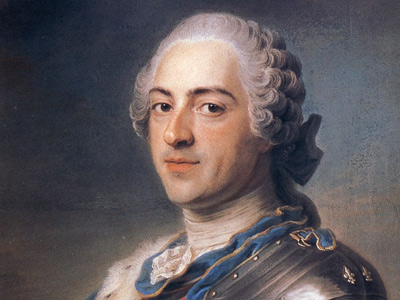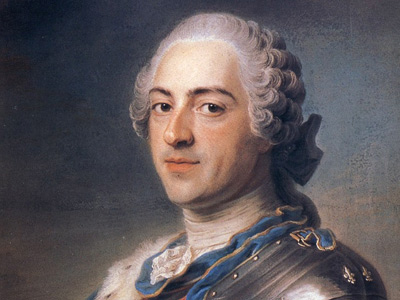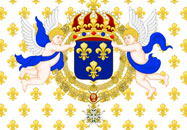Government of the Duke de Choiseul (1758–1770)
Louis named the Duke de Choiseul as his minister of foreign affairs on 3 December 1758, following the recommendation of Madame de Pompadour. In 1763, he became Minister of War, giving the role of minister of foreign affairs to his cousin, the Duc de Praslin. A few months later, he also became the Minister of the Navy, and became the most influential and powerful member of the government. In the council and circles of government, he was the leader of the philisophe faction, which included Madame de Pompadour, which sought to appease the Parlements and the Jansenists. On the diplomatic front, he negotiated a "Family Pact" with the Bourbon monarch of Spain (1761); negotiated the Treaty of Paris in 1761, and completed the integration of Lorraine into France (1766) upon the death of the King's father-in-law Stanisław Leszczyński, Duke of Lorraine. He incorporated Corsica into France (1768), and negotiated the marriage of his grandson, the future Louis XVI with Marie Antoinette (1770).
His most notable accomplishment was the reform modernization of the French military, based on the lessons learned during the Seven Years' War. Under Choiseul, the government, rather than the officers, took the responsibility of training, giving uniforms, and training soldiers. The artillery was standardized, and new tactics, based on the Prussian model, were adopted and taught. The Navy in 1763 had been reduced to just 47 vessels and twenty frigates, three times smaller than the British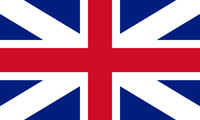 The Kingdom of Great Britain was a sovereign country in Western Europe from 1 May 1707 to the end of 31 December 1800. The state was created by the 1706 Treaty of Union and ratified by the Acts of Union 1707, which united the kingdoms of England (which included Wales) and Scotland to form a single kingdom encompassing the whole island of Great Britain and its outlying islands, with the exception of the Isle of Man and the Channel Islands. Royal Navy. fleet. He launched a major shipbuilding program to construct eighty vessels and forty-five new frigates, which would allow the French fleet, combined with the allied Spanish
The Kingdom of Great Britain was a sovereign country in Western Europe from 1 May 1707 to the end of 31 December 1800. The state was created by the 1706 Treaty of Union and ratified by the Acts of Union 1707, which united the kingdoms of England (which included Wales) and Scotland to form a single kingdom encompassing the whole island of Great Britain and its outlying islands, with the exception of the Isle of Man and the Channel Islands. Royal Navy. fleet. He launched a major shipbuilding program to construct eighty vessels and forty-five new frigates, which would allow the French fleet, combined with the allied Spanish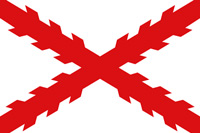 The Spanish Empire was a colonial empire governed by Spain and its predecessor states between 1492 and 1976. One of the largest empires in history, it was the first to usher the European Age of Discovery and achieve a global scale, controlling vast territory. It was one of the most powerful empires of the early modern period, reaching its maximum extent in the 18th century. fleet, to outnumber the Royal Navy.
The Spanish Empire was a colonial empire governed by Spain and its predecessor states between 1492 and 1976. One of the largest empires in history, it was the first to usher the European Age of Discovery and achieve a global scale, controlling vast territory. It was one of the most powerful empires of the early modern period, reaching its maximum extent in the 18th century. fleet, to outnumber the Royal Navy.
Suppression of the Jesuits (1764)
In 1764, at the urging of the Parlement, Madame Pompadour and his foreign minister, the Duc de Chosieul, Louis decided upon the Suppression of Jesuit Order in France. The Jesuits in France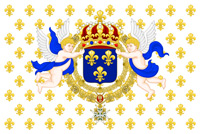 The Kingdom of France is the historiographical name or umbrella term given to various political entities of France in the medieval and early modern period. It was one of the most powerful states in Europe since the High Middle Ages. It was also an early colonial power, with possessions around the world. Colonial conflicts with Great Britain led to the loss of much of its North American holdings by 1763. The Kingdom of France adopted a written constitution in 1791, but the Kingdom was abolished a year later and replaced with the First French Republic. numbered 3,500; they had 150 establishments in France, including 85 colleges, which were considered the best in France; their graduates included Voltaire and Diderot. The Confessor of the King, by a tradition dating back to Henry IV, was a Jesuit. Agitation against the Jesuits began in 1760 in the provincial Parlements, where the Gallicans, supporters of a specifically French version of Catholicism, were strong. The complaint against the Jesuits was that they were independent of the authority of the King and the hierarchy of the church in France. The Jesuits had already been expelled from Portugal and its colony of Brazil in 1759, because of conflicts with the government and church hierarchy there.
The Kingdom of France is the historiographical name or umbrella term given to various political entities of France in the medieval and early modern period. It was one of the most powerful states in Europe since the High Middle Ages. It was also an early colonial power, with possessions around the world. Colonial conflicts with Great Britain led to the loss of much of its North American holdings by 1763. The Kingdom of France adopted a written constitution in 1791, but the Kingdom was abolished a year later and replaced with the First French Republic. numbered 3,500; they had 150 establishments in France, including 85 colleges, which were considered the best in France; their graduates included Voltaire and Diderot. The Confessor of the King, by a tradition dating back to Henry IV, was a Jesuit. Agitation against the Jesuits began in 1760 in the provincial Parlements, where the Gallicans, supporters of a specifically French version of Catholicism, were strong. The complaint against the Jesuits was that they were independent of the authority of the King and the hierarchy of the church in France. The Jesuits had already been expelled from Portugal and its colony of Brazil in 1759, because of conflicts with the government and church hierarchy there.
In France, the Parlements had taken the lead in attacking the Jesuits. On 12 February 1762, the Parlement of Rouen declared the Jesuits outside the law, forbid them to hold public positions or to teach, and demanded that they take an oath repudiating their beliefs. Between April and September 1762, the Parlements of Rennes, Bordeaux, Paris and Metz joined in the condemnation, followed in 1763 by Aix, Toulouse, Pau, Dijon and Grenoble. By the end of the year only the Parlements of Besançon, Douai, and the governments of Colmar, Flanders, Alsace and Franche-Compté, plus the Duchy of Lorraine, run by the Queen's father, the former King Stanislas, permitted the Jesuits to function.
The campaign against the Jesuits divided the royal household; his son the Dauphin, his daughters and the Queen supported the Jesuits, while Madame de Pompadaour, whose influence in the court was criticized by the Jesuits, wanted them gone. The indecisive King declared two years later that he had made the decision against his own feelings. The Jesuits departed, and were welcomed in Prussia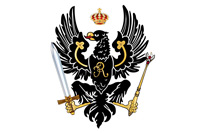 The Kingdom of Prussia was a German kingdom that constituted the state of Prussia between 1701 and 1918. It was the driving force behind the unification of Germany in 1871 and was the leading state of the German Empire until its dissolution in 1918. Although it took its name from the region called Prussia, it was based in the Margraviate of Brandenburg. Its capital was Berlin. and in Russia
The Kingdom of Prussia was a German kingdom that constituted the state of Prussia between 1701 and 1918. It was the driving force behind the unification of Germany in 1871 and was the leading state of the German Empire until its dissolution in 1918. Although it took its name from the region called Prussia, it was based in the Margraviate of Brandenburg. Its capital was Berlin. and in Russia Russian Empire was an empire and the final period of the Russian monarchy from 1721 to 1917, ruling across large parts of Eurasia. The rise of the Russian Empire coincided with the decline of neighbouring rival powers: the Swedish Empire, the Polish–Lithuanian Commonwealth, Qajar Iran, the Ottoman Empire, and Qing China. Russia remains the third-largest empire in history, surpassed only by the British Empire and the Mongol Empire.. The departure of the Jesuits weakened the church in France, and especially weakened the authority of the King, who, like a constitutional monarch, acted on behalf of the Parliament against his own beliefs.
Russian Empire was an empire and the final period of the Russian monarchy from 1721 to 1917, ruling across large parts of Eurasia. The rise of the Russian Empire coincided with the decline of neighbouring rival powers: the Swedish Empire, the Polish–Lithuanian Commonwealth, Qajar Iran, the Ottoman Empire, and Qing China. Russia remains the third-largest empire in history, surpassed only by the British Empire and the Mongol Empire.. The departure of the Jesuits weakened the church in France, and especially weakened the authority of the King, who, like a constitutional monarch, acted on behalf of the Parliament against his own beliefs.
Resistance from Parlements
Under the government of Choiseul, the Parlements of several French provinces continued to swear obedience to the King, while refusing to obey his intendents or to accept his new taxes. The Parlement of Franche-Comté in Besançon refused to collect the vingtieme tax imposed by the King to finance the war, claiming that only the Parlement could impose taxes. The King's government immediately dismissed the leaders of the Parlement and confined them to their residences. The Parlement of Normandy immediately supported that of Besançon; it wrote a remonstrance to the King on 5 July 1760, declaring that the Parlements represented all classes: "One King, one law, one Parlement; the law of the kingdom is a sacred pact of your alliance with the French nation; it is a kind of contract which destines the King to reign and the people to obey. In truth, no one except God can compel you to obey this sacred pact...but we can ask you, with respect, with submission...to keep your promises." This was too much for the King. He responded on 31 January 1761 that the Parlement's complaint "contained principles so false and so contrary to my authority and with expressions so indecent, particularly in connection with my Chancellor who only explained to you my wishes...that I send your letter back to you." The Parlement members of Besançon remained in exile.
The Parlement of Bordeaux went even further in its resistance to the royal government; in 1757 it brought accusations of corruption against the members of the government of the city of Bergerac, named by the Royal Council of the King. When the Royal Council blocked the pursuits of the Parlement, the Parlement wrote a protest to the King, declaring, "Sire, your Parlement cannot recognize any intermediate power it and your person; no, your Council has over the Parlement no authority, superiority, or jurisdiction."
Finances and the brief ministry of Silhouette
The prolonged war drained the treasury of the Kingdom; France paid not only for its own army, but subsidized the armies of its allies; in 1759 France paid 19 million livres to its allies, an amount which Choiseul reduced by one-third in 1761. His new finance minister, Étienne de Silhouette imposed new taxes aimed at the wealthy; taxes on horses, carriages, silk, paintings, coffee and furs, and other luxury goods. The new taxes were extremely unpopular with the aristocracy and wealthy; Silhouette was dismissed after eight months, and his name became the common expression for paper cutout made from a shadow, which, like his ministry, lasted only a moment. The King announced that he was giving his silver service to the mint, to be melted down and made into money.
The new Controller of Finances, Henri Bertin, a protege of Madame Pompadour named on 23 November 1759, reduced the luxury taxes of his predecessor, and instead proposed broadening of the tax base to include those classes which had long been excluded, and a new survey of the wealth of the nobility. Once again the Parliaments rebelled. When the Lieutenant General of Normandy appeared before the Parliament to register the decree. register or collect the new taxes. The same scene was reproduced in the other Parlements. Once again the King yielded to Madame de Pomapdour and her allies; the new decrees were withdrawn, Bertin was moved to a different position, the tax rolls were not enlarged, and no new taxes were collected; the debt remained.
Diplomacy – end of the Seven Years' War
The war with England continued, despite the death of King George II on 25 October 1761; the British Prime Minister William Pitt rejected French proposals for suggestions for negotiations. On 15 August 1761, France, Spain, Naples and Parma, all ruled by monarchs of the Bourbon family, signed the first "Family Pact" with a system of reciprocal guarantees of support if one or the other were attacked. At the same time, they signed a secret treaty with Charles III of Spain engaging Spain to declare war on England if the war was not over by May 1762. Learning of this pact, William Pitt wanted to declare an immediate war on Spain, but the new British King, George III, rejected the idea. The military forces of Frederick the Great in Prussia had been nearly exhausted in the long war against the combined forces of Austria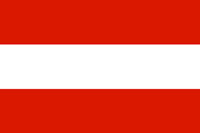 The Archduchy of Austria was a major principality of the Holy Roman Empire and the nucleus of the Habsburg monarchy. With its capital at Vienna, the archduchy was centered at the Empire's southeastern periphery. The archduchy's history as an imperial state ended with the dissolution of the Holy Roman Empire in 1806. It was replaced with the Lower and Upper Austria crown lands of the Austrian Empire. and Russia; but Frederick was saved by the sudden death of the Tsarina Elizabeth in 1762, and her replacement by Peter III of Russia, a fervent admirer of the Prussian King.
The Archduchy of Austria was a major principality of the Holy Roman Empire and the nucleus of the Habsburg monarchy. With its capital at Vienna, the archduchy was centered at the Empire's southeastern periphery. The archduchy's history as an imperial state ended with the dissolution of the Holy Roman Empire in 1806. It was replaced with the Lower and Upper Austria crown lands of the Austrian Empire. and Russia; but Frederick was saved by the sudden death of the Tsarina Elizabeth in 1762, and her replacement by Peter III of Russia, a fervent admirer of the Prussian King.
Choiseul had taken over direction of the French navy as well as the army in October 1761, and he pressed for an offensive to bring the war to a successful end. He persuaded the Parlements and the chambers of commerce of the major French cities to sponsor the construction of warships, and rebuilt the French Navy. The French army launched a new offensive against the Prussians and Spain, as promised by its agreement with France, launched an invasion in Portugal, an ally of Britain. However, once again the French initiatives were not enough. The French offensive in Hess-Kassel was defeated by the Prussians, the Spanish army in Portugal made little progress, and the British took the opportunity to land on Martinique and to invade Spain's colony Cuba. Choiseul decided it was time to end the war. The preliminary negotiations opened at Palace of Fontainebleau on 3 November 1762, and ended hostilities between England, France and Spain. The final treaty was signed in Paris on 10 February 1763. As a result of the War, France gave up its minor possessions in the West Indies; Marie Galante, Tobago and La Desiderade, but received back Guadaloupe, Martinique, and Santa Lucia, which, because of their sugar plantations, were considered of more value than all of French Canada or its territories in Canada, France kept only the Iles of Cape Breton and of the Saint-Laurence river; the valley of the Ohio, and the territories along the west bank of the Mississippi River. Louis formally ratified the treaty on 23 February, on the same day that his statue was unveiled on the Place Louis XV (today the Place de la Concorde).
France Enlarged: Lorraine and Corsica
The borders of France were enlarged for the last time before the Revolution by two additions; The Duchy of Lorraine, ruled by The King's father-in-law, Stanislas, reverted to France after his death, and officially was joined to the kingdom 27–28 March 1766. The acquisition of Corisca was more complicated. The island formally belonged to the Republic of Genoa, but an independent Republic of Corsica had been proclaimed in 1755 by Pasquale Paoli, and the rebels controlled most of the island. The Republic of Genoa did not have the military forces to conquer the island, and permitted Louis to send French troops to occupy the ports and major cities, to keep the island from falling into British hands. When the war ended, the island was formally granted to France by Treaty of Versailles on 19 May 1768. Louis sent the army to subdue the Corsican rebels; the army on the island eventually numbered twenty-seven thousand soldiers. In May 1769 the Corsican rebels were defeated at the Battle of Ponte Novu, and Paoli took refuge in England. In 1770 the island formally became a Province of France.
Commerce, agriculture and the "Starvation Pact" rumor
Two men had an enormous influence on the economic policies of the King. François Quesnay was the best-known economist in France. He was the King's doctor, and treated Madame de Pompadour, but was also a celebrated economic theorist, whose collected writings, "Tableau Économique" (1758), were avidly read by the King and his Court: Louis referred to him as "my thinker." His students included The Marquis de Mirabeau and Adam Smith. He was a critic of government regulation, and coined the term "bureaucracy" (literally "A government of desks"). The other was his disciple, he Minister of the Commerce of the King, Jacques Claude Marie Vincent de Gournay. The two men advocated removing as many restrictions as possible from the economy, to encourage greater production and trade. De Gournay's famous expression, laissez faire, laissez passer ("it be done, let it pass") was later adopted as the slogan of a whole school of free market economics.
De Gournay and Quesnay proposed in particular the liberalization of agricultural markets, which were strictly controlled, to encourage greater production, competition and lower prices. Following the doctrines of Quesnay and de Gournay, Louis's controller of finances, Henri Bertin, created a new Society of Agriculture and an Agricultural Committee within the government, comparable to those existing to support commerce. In May 1763, Bertin issued a decree permitting the tax-free circulation of grain without taxes. In August 1764, Bertin permitted the export of grain from twenty-seven French ports, later expanded to third-six. At the same time he established a large zone around Paris, where grain was reserved exclusively for feeding the Parisians, and established a cap on the grain price, which, if it was passed, would cause the exports to cease.
The policy of freeing grain prices was effective in good years, and resulted in increased trade and lower prices, but during years with poor harvests; 1766, 1767 and 1768, prices went up. Most of the Parlements, in regions which produced grain, supported the policy, but others, including Paris and Rouen, were highly critical. In those cities rumors began to circulate of a mythical "Starvation Pact", a supposed plot by the government to deliberately starve and eliminate the poor. These rumors eventually became one of the factors that provoked the French Revolution.
Preparations for a new war with England
The Duc de Choiseul devoted all of his considerable energy and talents to preparing a new war against England. In 1764, in a former Jesuit school he had closed, he created a new military preparatory school, to prepare students for the recently founded Military Academy. In 1769 he raised the Naval school to the level of a royal academy, to train officers for his new fleet. In the same year he established a military engineering school. He provided the army with hundreds of new cannons, which would be used with great success decades later during the French Revolution and by Napoleon. Using the Prussian army as a model, he reformed French military doctrine, making the state and not the officers responsible for training and equipping soldiers. A large part of the French Navy had been sunk or captured by the British in the Seven Years' War, In addition to the existing naval arsenals in Toulon, Brest and Rochefort, he opened two more in Marseille (1762) and Lorient (1764). The arsenals began building new ships; by 1772 the Navy had sixty-six ships of the line, thirty-five frigates, and twenty-one new corvettes. He and his allies in the government began planning for an invasion of England, and his government looked for new ways to challenge England. When the Duc de Broglie learned that the British were planning to tax the citizens of the British colonies in America, he wrote to the King: "It will be very curious to know what the result will be, and if their execution doesn't result in a Revolution in those states."
Choiseul combined his military preparations for war with a diplomatic alliance, The Pacte de Famille or Pact of the Family, which united with other countries ruled by Kings of the Bourbon dynasty; Spain, ruled by Louis's cousin Charles III of Spain, the Naples and Tuscany. Choiseul was so entirely focused on England as his future enemy that he almost entirely neglected the rest of Europe. He had no accredited Ambassadors in Poland, Prussia or Russia during most of the period, and stood by while Russia imposed its own candidate for King of Poland, and when Turkey and Russia went to war in 1768-70.
The dismissal of Choiseul
A new conflict between England and Spain over the remote Falkland Islands in 1770 brought about Choiseul's downfall. The British had established a settlement in the islands, which were also claimed by Spain. In early 1770 the Spanish governor of Buenos Aires sent five warships full of troops to the islands, ordering the British to leave. The British prepared to depart. When the news reached London, the British government demanded that the Spanish leave. Both sides began to prepare for war.
The possibility of a new war came just as France was undergoing a new confrontation between the King's government and the Parlement of Brittany, which once again refused to recognize the power of the King's government to impose taxes. The King wrote immediately to his cousin, the King of Spain, who wrote back that Spain did not want a war. Louis replied, "Gentleness and patience have guided me to the present, but my parlements, pushing to limit, have forgotten themselves to the point of disputing the sovereign authority that we possess only from the will of God. I am resolved to make myself obeyed by all available means..." On 24 December, the King sent a short note to Choiseul dismissing him from his post and ordering him to return to his home in Chateloup and to remain there. A similar note went to his cousin. Choiseul asked for two days to manage his affairs, but the King refused. Explaining the decision later to the Duke de Broglie, the King wrote, "The principles of the Choiseuls are too contrary to religion, and therefore to royal authority."
HISTORY
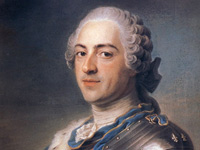
RESOURCES
This article uses material from the Wikipedia article "Louis XV of France (1710-1774)", which is released under the Creative Commons Attribution-Share-Alike License 3.0.
© Stories Preschool. All Rights Reserved.
